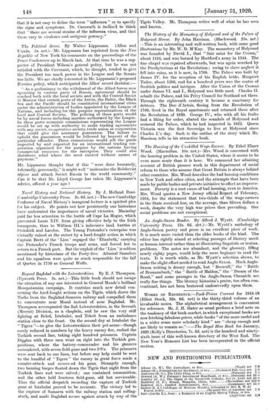The Political Scene. By Walter Lippmann. (Allen and Unwin. 55.
net.)—Mr. Lippmann has reprinted from the New Republic of New York his comments on the proceedings of the Peace Conference up to March last. At that time he was a sup- porter of President Wilson's general policy, but he was not satisfied with the Covenant, which, he thought, tended to give the President too much power in the League and the Senate too little. We are chiefly interested in Mr. Lippmann's proposed Russian policy, which anticipated the Allies' recent decision :— " As a preliminary to the withdrawal of the Allied forces now operating in various parts of Russia, agreement should be reached both with the local soviets and with the Central Soviet at Moscow that certain ports of the Arctic, the Baltic, the Black Sea and the Pacific should be constituted international cities under the administration of bodies appointed by the League of Nations, and 'including for this purpose representatives of the local and Central 'Soviets. The policing of these ports would be by naval forces including marines authorized by the League. In these ports economic commissions representing the League would be set up with authority to make trading agreements with any soviet, co-operative society,trade union or corporation that could give the necessary guarantees. The failure to uphold the guarantees would be followed by boycott of the particular offender. These commissions would sell the goods imported by and exported for an international trading cor- poration organized for the purpose by the nations having commercial resources for the enterprise. They could also distribute relief where the need existed without means of payment."
Mr. Lippmann thought that if this "were done humanely, tolerantly, generously," it might well "undermine the Bolshevist regime and attach Soviet Russia to the world community." Can it be that Mr. Lloyd George has taken Mr. Lippmann's advice, offered a year ago ?


































 Previous page
Previous page